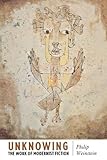Unknowing : The Work of Modernist Fiction / Philip Weinstein.
Material type: TextPublisher: Ithaca, NY : Cornell University Press, [2018]Copyright date: ©2005Description: 1 online resource (320 p.)Content type:
TextPublisher: Ithaca, NY : Cornell University Press, [2018]Copyright date: ©2005Description: 1 online resource (320 p.)Content type: - 9781501711749
- 809.3/9112/0904
- PN3503.W393 2005
- online - DeGruyter
| Item type | Current library | Call number | URL | Status | Notes | Barcode | |
|---|---|---|---|---|---|---|---|
 eBook
eBook
|
Biblioteca "Angelicum" Pont. Univ. S.Tommaso d'Aquino Nuvola online | online - DeGruyter (Browse shelf(Opens below)) | Online access | Not for loan (Accesso limitato) | Accesso per gli utenti autorizzati / Access for authorized users | (dgr)9781501711749 |
Frontmatter -- Contents -- Acknowledgments -- Introduction -- 1. Leaping: Kierkegaard's Fear and Trembling -- Part One. Knowing: "Sapere Aude!" — The West Dares to Know -- 2. Genealogy of Realism: An Enlightenment Narrative in Five Stages -- 3. Anatomy of Realism: Coming to Know, from Defoe to Dostoevsky -- Part Two. Unknowing: The Work of Modernist Fiction -- 4. Plotting Modernism: Freud -- 5. Uncanny Space: Flaubert to Beckett -- 6. Unbound Time: Proust, Kafka, Faulkner -- 7. Subject and/as Other: Kafka, Proust, Faulkner -- Part Three. Beyond Knowing: Postmodern and Postcolonial Flight m Gravity -- 8. Adventures in Hyperspace -- 9. Urban Nightmare and City Dreams: Rilke and Calvino -- 10. Passage and Passing: Forster and Rushdie -- 11. Arrest and Release: Faulkner, Garcia Marquez, Morrison -- Conclusion -- Notes -- Index
restricted access online access with authorization star
http://purl.org/coar/access_right/c_16ec
Philip Weinstein explores the modernist commitment to "unknowing" by addressing the work of three supreme experimental writers: Franz Kafka, Marcel Proust, and William Faulkner. In their novels, the narrative props that support the drama of coming to know are refused. When space turns uncanny rather than lawful, when time ceases to be linear and progressive, objects and others become unfamiliar. So does the subject seeking to know them. Weinstein argues that modernist texts work, by way of surprise and arrest, to subvert the familiarity and narrative progression intrinsic to realist fiction. Rather than staging the drama of coming to know, they stage the drama of coming to unknow. The signature move of modernism is shock, just as resolution is the trademark of realism.Kafka, Proust, and Faulkner wrought their most compelling experimental effects by undermining an earlier Enlightenment project of knowing. Weinstein draws on major Enlightenment thinkers to identify constituent components of the narrative of "coming to know"—the progressive narrative underwriting two centuries of Western realist fiction. The book proceeds by framing modernist unknowing between prior practices of realist knowing, on the one hand, and, on the other, certain later practices—postmodern and postcolonial—that move beyond knowing altogether. In so doing, Weinstein proposes a metahistory of the Western novel, from Daniel Defoe to Toni Morrison.
Mode of access: Internet via World Wide Web.
In English.
Description based on online resource; title from PDF title page (publisher's Web site, viewed 26. Apr 2024)


